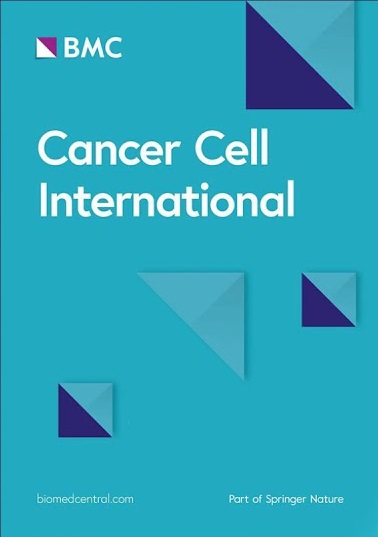The role of KRT7 in metastasis and prognosis of pancreatic cancer
IF 5.3
2区 医学
Q1 ONCOLOGY
引用次数: 0
Abstract
The aim of this study is to delve into the value of N6-Methyladenosine (m6A)-associated genes (MAGs) in pancreatic cancer (PC) prognosis. PC sequencing data and corresponding clinicopathological information were retrieved from GEO and TCGA databases. We filtered 19 MAGs in PC specimens and implemented functional annotation in biology. Later, the m6A modification pattern was stratified into m6Acluster A-B according to MAG expression levels, and further categorized into genecluster A-C based on differentially expressed genes between m6Acluster A and B. Next, a MAG-based prognostic prediction model was established by the least absolute shrinkage and selection operator (LASSO) regression analysis and multivariate Cox regression analysis. At last, the role of KRT7 in PC were explored. We found m6Acluster A pattern presented enrichment pathways associated with cell apoptosis, proliferation, migration, and cancer pathways. Additionally, high-risk group displayed more dismal prognosis and a higher programmed death-ligand 1 expression. The survival prediction ability of the model was verified in three independent PC GEO datasets. KRT7 is the most momentous risk gene in the established prognostic model. Among 18 clinical samples, the KRT7 protein in the surviving patient samples is lower than that in the deceased patient samples. We also identified elevated expression of KRT7 in PC tumor tissues compared to normal tissues using GEPIA 2. Then, the metastasis of PC cells was promoted by overexpressed KRT7 in vitro and in vivo. And IGF2BP3 upregulated KRT7 by increasing the mRNA stability of KRT7. The PPM built based on CXCL5, LY6K and KRT7 is an encouraging biomarker to define the prognosis. Additionally, IGF2BP3 promoted KRT7 by stabilizing mRNA of KRT7. And KRT7 promoted the metastasis of PC cells by promoting EMT.KRT7 在胰腺癌转移和预后中的作用
本研究旨在探讨N6-甲基腺苷(m6A)相关基因(MAGs)在胰腺癌(PC)预后中的价值。我们从 GEO 和 TCGA 数据库中检索了 PC 测序数据和相应的临床病理信息。我们筛选了 PC 标本中的 19 个 MAGs,并在生物学中进行了功能注释。随后,根据MAG表达水平将m6A修饰模式分为m6A群A-B,并根据m6A群A和B之间的差异表达基因将其进一步分为基因群A-C。最后,研究人员探讨了 KRT7 在 PC 中的作用。我们发现,m6Acluster A模式呈现出与细胞凋亡、增殖、迁移和癌症通路相关的富集通路。此外,高危组的预后更差,程序性死亡配体 1 的表达更高。该模型的生存预测能力在三个独立的 PC GEO 数据集中得到了验证。在已建立的预后模型中,KRT7是最重要的风险基因。在18个临床样本中,存活患者样本中的KRT7蛋白低于死亡患者样本中的KRT7蛋白。我们还利用 GEPIA 2 发现,与正常组织相比,KRT7 在 PC 肿瘤组织中的表达升高。IGF2BP3通过增加KRT7的mRNA稳定性来上调KRT7。基于 CXCL5、LY6K 和 KRT7 建立的 PPM 是一种令人鼓舞的生物标志物,可用于确定预后。此外,IGF2BP3 通过稳定 KRT7 的 mRNA 来促进 KRT7。KRT7通过促进EMT促进了PC细胞的转移。
本文章由计算机程序翻译,如有差异,请以英文原文为准。
求助全文
约1分钟内获得全文
求助全文
来源期刊

Cancer Cell International
ONCOLOGY-
CiteScore
10.90
自引率
1.70%
发文量
360
审稿时长
1 months
期刊介绍:
Cancer Cell International publishes articles on all aspects of cancer cell biology, originating largely from, but not limited to, work using cell culture techniques.
The journal focuses on novel cancer studies reporting data from biological experiments performed on cells grown in vitro, in two- or three-dimensional systems, and/or in vivo (animal experiments). These types of experiments have provided crucial data in many fields, from cell proliferation and transformation, to epithelial-mesenchymal interaction, to apoptosis, and host immune response to tumors.
Cancer Cell International also considers articles that focus on novel technologies or novel pathways in molecular analysis and on epidemiological studies that may affect patient care, as well as articles reporting translational cancer research studies where in vitro discoveries are bridged to the clinic. As such, the journal is interested in laboratory and animal studies reporting on novel biomarkers of tumor progression and response to therapy and on their applicability to human cancers.
 求助内容:
求助内容: 应助结果提醒方式:
应助结果提醒方式:


